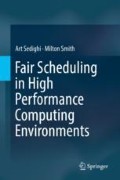Abstract
Chapter 8 outlined 17 cases simulated using dSim. Both the traditional, fair-share scheduling algorithm and the Rawlsian Fair scheduling algorithm developed for our work were used in these simulations. Table 9.1 outlines the different classes of simulations and their purposes.
Access this chapter
Tax calculation will be finalised at checkout
Purchases are for personal use only
Notes
- 1.
17 tests, 7 different scheduling algorithms, and 5000+ tasks per run
References
J. Rawls, Justice as fairness: A restatement (Harvard University Press, Cambridge, 2001)
Author information
Authors and Affiliations
Rights and permissions
Copyright information
© 2019 Springer Nature Switzerland AG
About this chapter
Cite this chapter
Sedighi, A., Smith, M. (2019). Overview of Results. In: Fair Scheduling in High Performance Computing Environments. Springer, Cham. https://doi.org/10.1007/978-3-030-14568-2_9
Download citation
DOI: https://doi.org/10.1007/978-3-030-14568-2_9
Published:
Publisher Name: Springer, Cham
Print ISBN: 978-3-030-14567-5
Online ISBN: 978-3-030-14568-2
eBook Packages: Computer ScienceComputer Science (R0)

